
|
Biographical articles From Fairouz; Legend and Legacy |
|
|
Origins of a Legendby Sargon BoulosOne day in 1935, Wadi' Haddad moved his wife and two children into a new home on the cobblestone alley called zuqaq al-blat, an old neighborhood in Beirut where the poor of all denominations have for generations found company and shelter. The Haddads new home consisted of a single room on the street level of a typical stone house that faced Beirut's Patriarchate school. Several other families were also living in the house; the residents shared the kitchen and other facilities. This was a time of migrations when a family could suddenly appear from nowhere and seek their next of kin, relatives, or just acquaintances from their own village who had already arrived in the big city. Wadi' (a name meaning "meek"), who worked as a typesetter in a nearby print shop, was quiet and gentle in manner; he was readily accepted by the folk of the neighborhood as one of themselves.
|
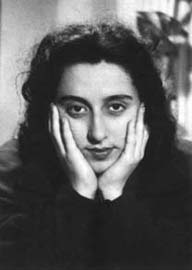
|
|
The eldest child in Haddad's family was a girl named Nouhad
(meaning"sigh" or "splendor"), who would later grow up to be Fayrouz,
one of the most famous singers of the Middle East and a legend in her
own time. From her early childhood, Fayrouz displayed a natural flair
for singing. Many a winter night, in neighborhood gatherings, she
would surprise everyone by suddenly bursting out into song. Her family
could not afford to own a radio, the magical commodity possessed by a
fortunate few; it was a vehicle for dreams that, in the houses of the
poor, provided solace and a vague feeling of belonging to whatever was
throbbing out there beyond their reach. She used to sit on the window
ledge to listen to the songs from the neighbor's radio that fascinated
her. Some of the songs that she loved to sing over and over again in
those early days were those by Laila Murad and Asmahan, two Egyptian
women singers famous at that time. She did that as she stood in the
backyard washing utensils, kneading the dough for marqouq (the
Lebanese mountain bread), or helping her mother in the morning. At the
same time, being the oldest, she had to take care of her two sisters,
Hoda and Amal, and her brother Joseph. Sharing things was an article
of faith, as it still is among the poor. Once a week, a woman neighbor
would shout to the mother from the window to send her children over
for their bath. She would bathe the Haddad children with her own and
before they would be tucked in bed the Haddad girl, lounging on her
mattress, would sing for them a song or two for a good night's sleep.
|
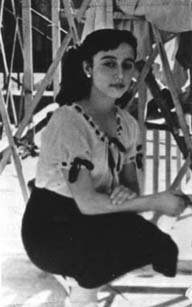 Nouhad Haddad (Fayrouz) - 1946 |
|
The father put aside some of his meager income
for his children's education, so Fayrouz was able to attend school,
where her voice was immediately recognized as having a unique quality
that could transmute ordinary national hymns into something beguiling.
At a school party one day in 1947, a teacher from the Lebanese
Conservatory heard her and was struck by a certain intimation that he
had just made a discovery. This man, Muhammad Fleifel, was looking for
new talents at that time among school children to sing national hymns
for airing on the newly established Lebanese Radio Station. Heanng the
golden reverberations latent within the young singer's throat, Fleifel
tended to her voice with fatherly care. He instructed her not to eat
spicy food, citrus, or anything else that might hurt her vocal cords.
He also cautioned her about singing in high register, or parts that
required a shrill delivery. Later on, he was instrumental in helping
her enter the National Conservatory. Perhaps his most outstanding
contribution is that he taught her how to chant verses from the Koran
according to what is known as tajwid, the high style of Koranic
intonation in classic Arabic.
|
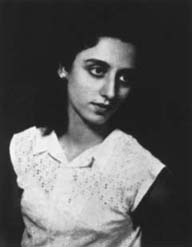 Nouhad Haddad (Fayrouz) - 1946
|
|
One day, when Fleifel was presenting a group of songs sung by Fayrouz
among others, the head of the music department at the Lebanese Radio
Station, Halim alRumi, happened to hear Fayrouz at the recording room
and asked to see the girl. After the program was over, a shy, thin
girl came to his office. When he asked her if she wanted to sing on
the radio, she said that she did. He asked her to sing something for
him other than hymns. She thereupon sang Ya Zahratan Fi Khayali by
Farid al-Atrash, and Mawwal by Asmahan. Al-Rumi was deeply impressed
by her voice, which was typically Eastern and at the same time
flexible enough to render a Western mode admirably. She was appointed
as a chorus singer at the radio station in Beirut.
|
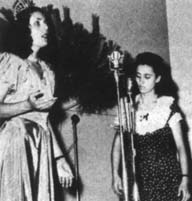 Nouhad singing in a school performance - 1947
|
|
"My wish was to sing on the radio," Fayrouz
reminisces. "I was told then that I'd be paid 100 pounds ($21.00) a
month. To me, this was overwhelming. But at the end of the month I
wasn't fortunate enough to fill my eyes with a 100-pound note, because
of the tax deductions. It took me a long time to get hold of a
100-pound note intact." Her father objected to her going to the radio station at first. It took a lot of coaxing and some heavyhanded interference by close acquaintances to convince him. He stipulated that Fayrouz was to be accompanied by her mother, her brother Joseph, or the neighbor's boy when she went to the station.
|
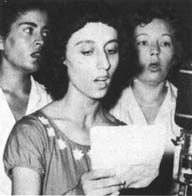 Nouhad in the forefront singing at the Lebanese Radio Station - 1950
|
|
This was a period of practice and observation for Fayrouz. She closely
studied the style of delivery of each singer in the chorus, and it
often happened that she substituted for another singer who was delayed
or failed to appear. She had a keen artistic sensibility and a memory
so sharp that she was able to learn by heart in two hours four pages
of poetry or five of notation. Her first song was composed by Halim al-Rumi, with words by Michael Awadh, and went: I left my heart to follow you/but ended up burning/far away from your love. The second one, In an Atmosphere of Magic and Beauty, was in the Egyptian dialect. Al-Rumi, so excited about the talent he had discovered, introduced Fayrouz to 'Assi Rahbani, a policeman by profession and an aspiring composer who was already aware of the talented new voice and anxious to meet Fayrouz. |
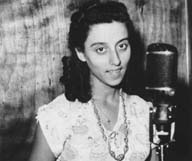 Nouhad Haddad singing at the Lebanese Radio Station - 1949 |
|
The subsequent
collaboration between the composer and the singer eventually resulted
in a song that was to launch Fayrouz for the first time as a major
talent on a popular scale. At first, however, their efforts were
mainly in the area of light, dancy tunes. Beirut was attracting big
bands who came from overseas to play tangos and rumbas to an expanding
Westernized segment in the Lebanese capital. One of these was the
Eduardo Bianco band from Argentina. While recording at the Near East
Broadcasting studios, Sabri Sharif, who directed the music section
there, suggested a new experiment hitherto untried in Eastern music.
Fayrouz was to sing, with Bianco's orchestra, tunes originally
composed for dancing, like La Compersita and the tango La Boheme. This
took place on October 1, 1951, a decisive day in the life of Fayrouz
and the two Rahbani brothers, 'Assi and Mansour. They believed that
this was the true beginning of the dance-song in Arab music; only
Midhat 'Assim an Egyptian composer, had been experimenting in this
direction before.
|
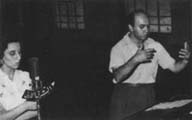 With conductor Tawfiq al-Basha singing solo at the Near East Radio Station - 1950 |
|
Wearing shorts, he sported a cigar and strolled about in the guise of
a genius virtuoso who, replete with talent and youth, lacked only the
right singer who would catapult him into fame. The watershed song, that launched their career, was not a dance-song but a melancholc son called 'Itab (Blame) that began: You keep blaming me and I/of blame have had enough/my body has withered away/under the burden/and you say/you want to go away/please do/my heart is used to pain. Overnight, 'Itab established Fayrouz as a major singer throughout the Arab world. One od the reasons for the song's sucess was the excellence of the equipment at the Damascus radio station where the song was recorded on November 12, 1952. Later a commercial disc was cut in Paris. The young singer was known to her listeners as Yola or as Fatat al-Jabal (Mountain Girl). Al-Rumi suggested that she take the "stage name" Fayrouz (which means "turquoise") because her voice reminded him of a precious stone. At first she thought he was joking, but later on she took his advice.
|
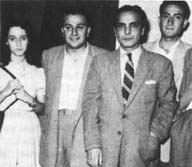
(From left to right) Fayrouz, 'Assi Rahbani, Halim al-Rumi and Mansour Rahbani - 1951 |
|
At that time, radio program went directly on the
air and were not record ed. While waiting their turn, Fayrouz and her
composer 'Assi, by now her constant companion, used to sit under a
tree near a pond in the backyard of the broadcasting studio. Sometimes
she daydreamed, but often they chatted together to kill time. She did
not anticipate a great future for herself as a singer. Rather, her
real dream was to become a teacher. She had said on many occasions
that she would never get married. Brought up in a devout Melkite
household, almost ascetic in her manners and bearing, Fayrouz was
typical of many Lebanese young women of her class and age. Many of the
people who have known her tell how they often found her during a break
kneeling in prayer somewhere in the vicinity of the recording studio.
|
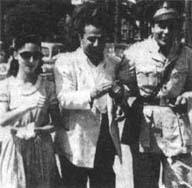
(From left to right) Fayrouz, 'Assi Rahbani and Mansour Rahbani in his policeman's attire - 1951 |
|
One day Fayrouz, in passing, told 'Assi that she did not like the way
he paid attention to a certain girl at the station. This innocent
remark did not go unnoticed. She still kept to herself and persisted
in her obstinate rejection of the idea of marriage. But on a certain
spring day in 1953, while they were practicing together at the edge of
the same pond, under the same tree, 'Assi repeated an earlier offer of
marriage. This time Fayrouz said yes. They got married in July, 1954. At their wedding, large crowds of Beirutis gathered in the summer Sunday afternoon to witness the ceremonies. To the Lebanese, Hotel Masabki in Shtura, surrounded by aloe trees, is a dream place, that lies in the heart of Lebanon's mountains; there, right after the wedding, the bride and groom went to spend their honeymoon.
|
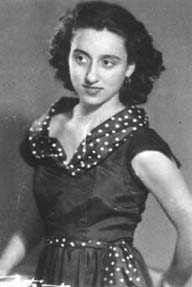
Fayrouz - 1951 |
|
When the young couple returned from their honeymoon, they moved into a
modern villa in the village of Antilias in the suburbs of Beirut. On one
side of the house lay orange groves and the Mediterranean; from the
other side, one could see cypress woods and mountains. This typically
Lebanese setting contributed to the atmosphere of her future songs.
|
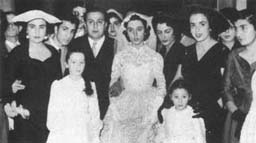
Fayrouz and Assi Rahbani on their wedding day surrounded by members of their families; Fayrouz's younger sisters Hoda and Amal appear before the bride and bridegroom - 1954 |
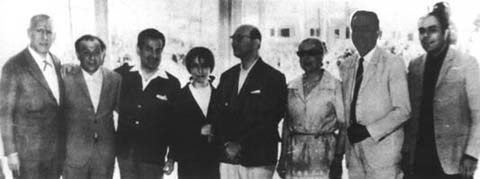
(From left to right) Najib Hankash, Assi Rahbani, Farid al-Atrash, Fayrouz, Muhammad Abd al-Wahab, Badi'a Masabni, Filimon Wahbeh, and Mansour Rahbani - 1955
|
|
The first major success on the scale of the entire Arab world took place
one year later, in the summer of 1955, when Fayrouz and her husband were
formally invited to the Egyptian capital to air their songs from the
Egyptian radio station. The couple spent five months in Cairo, then the
center of Arab theatre, cinema, and song. Every night Fayrouz would be
introduced to some star she had previously seen only on the silver
screen. Celebrated Egyptian composers approached her to sing for them,
film-makers asked her to star for them, but Fayrouz - by now pregnant -
politely declined. In her private moments she would go out to the
streets of Cairo and lose herself in the crowds. Sometimes she would
seek a poor juggler who played his pianola on a street corner; he was an
artist in his own right, she would think to herself. Other times, she
would sit alone wondering what kind of future her new baby would have.
|
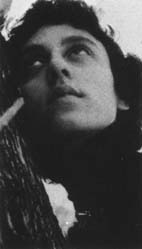
Fayrouz - 1951 |
|
Back in Lebanon, she gave birth to her son Ziad on
January 1, 1956. Even while she was spending much of each day indoors
caring for her baby, Fayrouz was preparing to move beyond the limited
arena of the recording studios. In the summer of 1957, she faced an audience in the open for the first time, standing at the base of one of the six columns that comprise the temple of Jupiter in Baalbeck. It was the largest audience that had ever gathered at the Roman temple. Under a crescent moon, Fayrouz, flooded with blue light, began to sing, in a calm, confident voice, Lubnan Ya Akhdar Hilo (O Green, Sweet Lebanon). People were spellbound; it was a magical moment. From that day on, Fayrouz would sing and act, at least once a year, in major musicals such as al-Baalbakiyya (The Baalbeck Woman), a fantasy in which gods ordain Voice to come to life among humans; Jisr al-Qamar (Bridge of the Moon), where a charitable fairy makes peace between parties hostile to each other; and Ayyam Fakhreddin (The Days of Fakhreddin), the story of a seventeenth-century prince who struggles to rebuild his country, having faithfully fought for its liberation. Fayrouz was on her way.
|
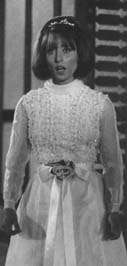
Fayrouz at the Lebanese Television Station - 1956 |
|
Whereas before her talent had found expression only through the lyrics
and music of the two Lebanese brothers 'Assi and Mansour Rahbani, now
the most creative poets of the Arab world rushed to compose lyrics to be
interpreted by her voice. The list of those who have written lyrics for
one or more of her over 800 songs includes 'Omar Abu Risha, Qablan
Mkarzil, Nizar Qabbani, Michel Trad, Sa'id 'Aql, Joseph Harb, As'ad
Saba, Badawi al-Jabal, Abu Salma, and other contemporary poets. She has
also sung works by Kahlil Gibran, Mikha'il Nu'aimeh, Elias Abu Shabaka,
Harun H. Rashid, and Boulus Salameh, as well as by such ancient
classical poets as Ibn Dhuraiq alBaghdadi, Ibn Jubair, and Ayadmur
al-Muhyawi. Fayrouz's list of composers has expanded to include Tawfiq
al-Basha, Fi lmon Wahbeh, Zaki Nasif, Khali d Abul Nasr, George Daher,
Muhammad 'Abd alWahab, Halim al-Rumi, and now her own son Ziad.
|
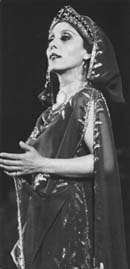
Fayrouz, who sang at London's Albert Hall in 1962, returns to London's Palladium in 1978. |
|
Since the first time she appeared live before an
audience in 1957, Fayrouz has traveled to places that as a child she
seemingly could hope to know only through her grandparents' tales. She
has sung at the ruins of the Philadelphia Amphitheatre in Amman, as well
as in Damascus, Baghdad, Rabat, Algiers, Cairo, Tunis; she has travelcd
overseas, reaching out to Arab emigrants in Rio de Janiero, Buenos
Aires, New York, San Francisco, Montreal, London, Paris, and many other
cities throughout the world. On these trips, Fayrouz has been offered as
a traditional gesture of welcome, the symbolic key to many cities;
perhaps the closest to her heart remains the golden key she received
from the Mayor of Jerusalem which she received during a private visit
there with her father in 1961. Although Fayrouz did not sing during her
one visit to the holy city, Jerusalem is honored in many of the songs
she has sung sincc hcr pilgrimage there.
|
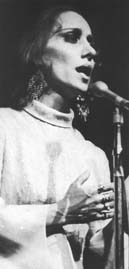
Fayrouz at Carnegie Hall in New York City - 1971 |
|
For the girl who loved to sing to her friends and neighbors in zuqaq
al-blat, it was an overwhelming experience when in 1957, President and
Mrs. Camille Chamoun presented her with the "Cavalier," the highest
medal ever conferred on a Lebanese artist; twelve years later, a
memorial Lebanese stamp was issued in her name. Meeting royalty, once an
experience she had expected to encounter only in the fairy tales of
childhood or the fantasies that she played out in her musical dramas,
has become a reality for her. King Hassan II of Morocco not only invited
her to perform at the Royal Palace but appeared in person to greet her
at the Rabat airport. And in 1963, King Hussein of Jordan presented her
with the Medal of Honor, followed by His Majesty's Gold Medal in
1975. Yet to Fayrouz, all the official acclaim and recognition that she has received over the years does not parallel the joy she experiences as she sings when she spots the absorbed attention of a single anonymous listener in a crowd. To her, singing is not merely a perfected profession, but a way of life. The Fayrouz of today, like the Fayrouz of yester-year, continues to attend mass in the village church at Antilias. There, every year, during Holy Week she sings to the devout villagers with a dedication that perhaps is equalled only by their sirnple piety. It is this dedication which consistently refines her talent and continues to set Fayrouz apart in a category all her own amid the chaotic trends of Middle Eastern music.
|
|
My sister and I.Joseph W. Haddad
|
|
|
Nouhad (known later as Fayrouz) was born in Beirut, in a modest house.
She attended the St. Joseph School for girls. Our father worked hard
as a typesetter in a printing shop to provide the proper shelter and
education for us. Due to World War II, he could no longer afford the
luxury of private schools, so Nouhad had to go to a public school. Our
family had a rough time but our mother Liza al-Bustani did the
impossible to retain our pride among other children. She encouraged us
to go to church every Sunday. She raised us on the love of others. "Do
not envy others, be satisfied with what you have, and always love each
other" - those were her daily words to us from our first day till she
passed away in 1961 (she was only 45). Our youth was full of pain and
poverty, but we grew up with dignity and pride.
|
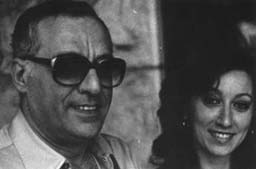
Fayrouz 's brother Joseph Haddad and sister Hoda |
| God gave my sister the virtues of silence, endurance, and love for others. I always considered her to be wiser and stronger than myself. Her truly good nature was demonstrated in a small incident which I still recall. During my childhood I used to get scared of darkness and my father, realizing this, tried to help me out by placing an orange in the backyard and telling my sister and me, "the one who brings the orange will receive extra pocket money on Sunday." So, Nouhad would go out without any hesitation, get the orange and give it to me without my father's knowledge, so that I could get the extra money, as well. Of course, this encouraged me, later, to get the orange myself and overcome my fear of darkness. She never stopped looking after me, even after we grew up. | |
| Every year we used to go to our village, Dbayeh al-Chouf, and spend the summer at our grandmother's (on my mother's side). We loved our grandmother very much and enjoyed her stories about Mexico and America, where she spent a few years of her youth with grandfather. My sister used to enjoy getting wood from the forest during September for winter use, and when in the forest she would sing in a very loud voice with echoes reaching the village. It was then that we realized my sister had a beautiful voice. In fact, she enjoyed singing and never turned down a request; she would sing for hours and hours as an amateur. |
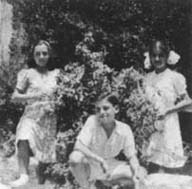
Nouhad Hadded (left) with two friends, at grandmother's garden in the village of Dbayeh al-Chouf - 1942. |
|
When she was 14 years of age, the principal of her school asked her if
she would sing in the presence of Muhammad Fleifel, a musician and one
of founders of the Lebanese Conservatory, who was looking for new
voices forming a choral group for a program to be given on an official
occasion. Fleifel liked her voice and asked her if she would join his
group of singers. She accepted but had to obtain our father's
permission first. When she sang on that day she never thought that she
had earned the key to fame and success.
|
|
|
My mother and I were pleased when my sister told us about this event,
but we decided not to tell my father because we were positive that, with
his conservative mentality, he would object to the idea of seeing my
sister singing in public. So, I started accompanying her to the
Fleifels' for four or five years where she learned how to sing with
method. At the same time Mr. Fleifel arranged for her to study at the
Lebanese Conservatory. She was a very bright student, and passed the
requirements for graduation. My mother and l were under the impression
that my father was unaware of the study program and decided to surprise
him on graduation day (though it appeared later on that my father may
have been aware, but was prevented by his pride from admitting it
openly, in order not to discourage his talented daughter). On that day,
we told him that we had received invitation cards to attend a concert
and wanted him to be with us. After a long argument, he agreed to
attend. We arrived there on time, the curtain went up and after a short
while Nouhad appeared on the stage and that was the biggest shock of his
life, seeing his own daughter standing majestically, singing a variety
of songs and receiving her diploma. I looked at his face to see tears
flowing down on his cheeks. He was the happiest of all the audience, but
never admitted that.
|
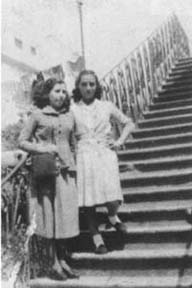
Nouhad Haddad (Fayrouz) to the right with a friend at the staircase of the neighbors - 1944 |
|
Later on, she was offered a job at the Lebanese Radio Station, but my
father raised hell as he wanted her to pursue her normal high school
studies. My uncle (my mother's other youngest brother), whom father
loved very much and whose opinions he respected, was the one who
convinced him to let her accept the job. My father gave his consent on
condition that she not go alone and that I always accompany her. She
joined the Lebanese Radio Station as a "Distinguished Singer" in the
chorus and worked very hard. One day, Halim al-Rumi, a musician and the
program's director, called Nouhad and told her that she would sing as a
soloist. He further suggested that her name be changed to Fayrouz
because that was easier to pronounce, and Fayrouz became her
artistic name. I remember that the first time she sang solo, she was
rather frightened, as I could see from the control room. When she
finished her first song, all the staff ran toward her to congratulate
her and I was the only one who could not move an inch, as I was stunned
with her performance. In time she sang more songs and started to become
popular.
|
|
|
During this time the Rahbani brothers ('Assi and Mansour) were coming
to the Radio Station to present their programs and there Fayrouz and
'Assi met. She st arted singing their songs and her fans increased in
number and Fayrouz be came famous. Neighboring countries asked for her
songs and we used to go with 'Assi and Mansour to Damascus, Syria,
every week to record her songs. I accompanied her day and night until
she got married to 'Assi in July 1954. Naturally, I felt very badly
about her absence but with her tenderness and sensitive feelings she
managed to call me almost daily and this kept our relationship very
close. Fayrouz has become a very famous singer who is adored by millions of people, but to me she is still Nouhad, my sister.
|
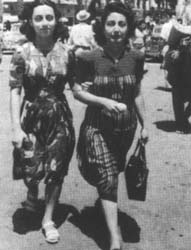
Nouhad with her mother Liza al-Boustani crossing Marty's Square in Beirut - 1945. |
|
Very few of the many things which have been said and very few of the
things that have been said and written about her, particularly during
the past few years, are true, and no one knows about my sister except
she and I.
|
|
The Rahbanis |
|
|
As a young man, I tried to make melodies. Somehow, it didn't work out.
The tunes were special, unlike any composed by other Arab musicians.
I realized then that we must do something new. Since then we've
studied music thoroughly. There was a professor called Guillard; he
taught us music. Do you believe that the orchestras in those days were
better than they are now? We went on playing with the orchestra while
we studied.
'Assi Rahbani |
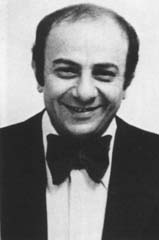
'Assi Rahbani |
|
Behind all that has been said about our achievements in the field of
Arab music, I think we've done only what we've felt. If I had to narrow
down the new elements we've been able to introduce into the mainstream
of Arab music, I'd say this: we tackled new melodic forms that were
not popular at that time; we adapted dance tunes like the tango and
the swing; we took up folklore as it is and arranged it in a new way,
skits that had their origin in folkloric traditions. We also arranged
and orchestrated the ancient muwashshahat, at the same time composing
classic poetry similar to the muwashshahat into music. We introduced
the theatrical sketch, and the play, in which we arranged the
quarter. Mansour Rahbani |
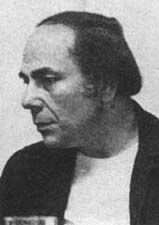
Mansour Rahbani |
|
'Assi and Mansour Rahbani were born and raised in
the small Lebanese village of Antilias, a few miles northeast of
Beirut. Their father played the buzuq (a long-necked fretted
lute with metal strings). Nightly the father played on the
buzuq the music of Sayyid Darwish and other popular musicians
of the period. As boys, the Rahbanis joined a musical group formed by
Father Paul Ashkar, becoming familiar in this way with religious
music. Although they wanted to pursue advanced studies in music, a
lack of funds forced them to take jobs as policemen in Beirut. After
some years, they were able to enter the Lebanese Academy of Arts to
study under the French professor Bertrand Robier; they studied Western
music and expanded their training in Middle Eastern music as well. When they graduated, the Rahbanis became joint directors of a radio program. They originated a series of song-skits, a sort of musical theatre which became highly successful and secured their reputation. Their collaboration with Fayrouz be gan when she was hired as one of the performers on their show. Since that time the Rahbanis have become Lebanon's most influential composers. According to Claude Rostand, they are the originators of Arab light opera, and their work in this area has become prolific. The Rahbanis have also played a leading role in the current adaptation of ancient Arabic music to modern instruments and orchestration.
|
|

al@mashriq 960812